Sensor Sweep: Lovecraft Manga, Manly Wade Wellman, D.C. Comics
Monday , 26, May 2025 Sensor Sweep Leave a commentWeird Westerns (Crime Reads): The weird western is nothing new. Since at least 1932, with Robert E. Howard’s “The Horror from the Mound,” writers have been combining fantasy, science-fiction, and horror with the Old West in novels, stories, comics, and films. The genre built to a crescendo in the 1980s. The last major iteration I can remember is the 2011 movie Cowboys & Aliens.
Fiction (Frontier Partisans): Since I was a tweener, I have been a fan of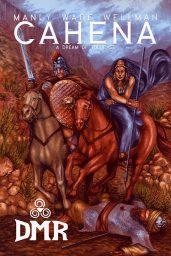 Manly Wade Wellman. Initially, it was his tales of Kardios in the Swords Against Darkness anthologies. However, I soon began tracking down his yarns regarding John the Balladeer. Since then, I’ve read the vast majority of MWW’s SF/fantasy/horror novels. Manly’s final novel was Cahena.
Manly Wade Wellman. Initially, it was his tales of Kardios in the Swords Against Darkness anthologies. However, I soon began tracking down his yarns regarding John the Balladeer. Since then, I’ve read the vast majority of MWW’s SF/fantasy/horror novels. Manly’s final novel was Cahena.
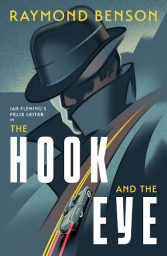 James Bond (Book Bond): Cover art for Raymond Benson’s Felix Leiter spin-off adventure, The Hook and the Eye, has been revealed, and it’s pretty slick! The eBook serialization begins May 27th. The novel will be released in paperback in October.
James Bond (Book Bond): Cover art for Raymond Benson’s Felix Leiter spin-off adventure, The Hook and the Eye, has been revealed, and it’s pretty slick! The eBook serialization begins May 27th. The novel will be released in paperback in October.
Writing (Kairos): The video’s premise is deceptively simple. The Joy of Editing editor asks two simple questions:
- “Does this scene need to be in the film?”
- “If yes, what storytelling jobs is it doing?”
A lot of writers never ask those questions. That’s why too many novel manuscripts read like first drafts. They haven’t been edited; they’ve just been spellchecked.
Sherlock Holmes (Comics Radio): I should preface my review by saying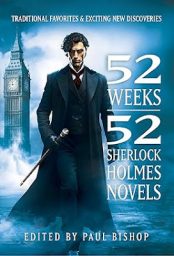 that I have four essays in this volume, discussing the books The Seven-Percent Solution, The Daughter of Sherlock Holmes, A Study in Scarlet Women, and A Study in Charlotte and editor Paul Bishop was kind enough to allow me to co-host several episodes of his now-retired Six-Gun Justice podcast. But setting aside my own contributions, I can honestly say that this book is a ton of fun.
that I have four essays in this volume, discussing the books The Seven-Percent Solution, The Daughter of Sherlock Holmes, A Study in Scarlet Women, and A Study in Charlotte and editor Paul Bishop was kind enough to allow me to co-host several episodes of his now-retired Six-Gun Justice podcast. But setting aside my own contributions, I can honestly say that this book is a ton of fun.
Current (Lotus Eaters): The Gorilla Question
Fantasy (Dark Worlds Quarterly): In several posts I have given my opinion on various Sword & Sorcery novels. But the Internet is a big place and there are many others who have their take on these books. So today I will let them speak for themselves. I don’t always agree, but that’s the beauty of criticism. I see one thing. You see another. I can’t claim to have read all of these, but I can say I plan to read them all.
Tolkien (Parish Catechist): This book – J.R.R. Tolkien’s Sanctifying Myth, Understanding Middle Earth by Bradley J. Birzer – is a book I’ve been wishing existed ever since I read The Fellowship: The Literary Lives of the Inklings: J.R.R. Tolkien, C.S. Lewis, Owen Barfield, Charles Williams (that book is also a good read).
Cinema (Mystery File): THE DARK PAST. Columbia Pictures, 1948. William Holden, Nina Foch, Lee J. Cobb, Adele Jergens, Stephen Dunne, Lois Maxwell, Berry Kroeger, Steven Geray. Director: Rudolph Maté. You might think that, with the title The Dark Past, that this Columbia production was a film noir.
Warhammer (Track of Words): Hello and welcome to this Rapid Fire author interview, where today I’m joined by Black Library author and Track of Words regular David Guymer to talk about his latest Age of Sigmar novel – Verminslayer. It’s been a while since David’s last novel-length contribution to the fan-favourite Gotrek Gurnisson series
Westerns (Western Musings): This 1973 novel is a puzzle to me. Not the plot,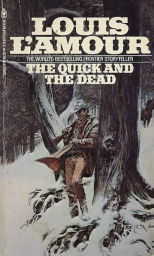 meager as it is, that is easily understood. The puzzle is the utter simple-mindedness this usually on-top-of-it author brings to this tale. I add, this novel is often considered one of L’Amour’s best—that in itself is a puzzle to me.
meager as it is, that is easily understood. The puzzle is the utter simple-mindedness this usually on-top-of-it author brings to this tale. I add, this novel is often considered one of L’Amour’s best—that in itself is a puzzle to me.
Science Fiction (Skulls in the Stars): Suddenly, I found myself back in a Fred Saberhagen mood. Saberhagen is one of those science fiction/fantasy authors who doesn’t get enough attention these days, considering how many enjoyable books and short stories he has written. I’ve talked before about his fantasy Book of Swords trilogy, following the journeys of twelve swords of power and the mischief and misery the bring with them.
James Bond (Jeremy Duns): Starting in late 1955, American TV producer Henry Morgenthau III had been trying to get a new project off the ground: a TV series about an American secret agent working in Jamaica. Working with another producer, Martin Stone, by April 1956 he had an eight-page proposal for the show:
Science Fiction (Rough Edges): Of course, in the hands of the master of space opera,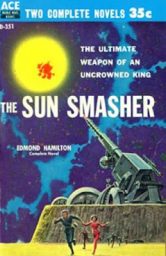 Edmond Hamilton, things play out a lot differently from there than they would in a Cornell Woolrich story. Veteran readers won’t be surprised when a mysterious man shows up
Edmond Hamilton, things play out a lot differently from there than they would in a Cornell Woolrich story. Veteran readers won’t be surprised when a mysterious man shows up
Radio (BBC): Casino Royale Drama on 4 Hugh Bonneville and Susannah Fielding join Toby Stephens in this classic spy thriller. Can Bond bankrupt villainous Le Chiffre at the Casino Baccarat table? Martin Jarvis directs.
History (Ken Lizzi): With that background I was comfortable picking up Harold Lamb’s Alexander of Macedon. I’ve been wanting to read more Lamb anyway. If you swim in the waters of Sword & Sorcery you’ve probably encountered Harold Lamb’s name. Robert E. Howard was a fan, which should tell you enough. The recently departed Howard Jones was also a notable fan, having edited the Bison Books editions of Lamb collections
Science Fiction (A Deep Look): The Short: I recently reread one of my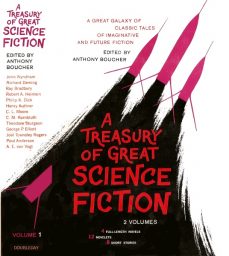 favorite SF anthologies as a much younger person, A Treasury of Great Science Fiction, Volume One and Volume Two, Anthony Boucher editor, 1959 Doubleday/1960 Science Fiction Book Club. It was available for purchase only as a two volume set when new. I am not aware of any other SF anthology that includes two novels and 10 pieces of short fiction, much less one that includes four novels and 20 short fiction works in the set.
favorite SF anthologies as a much younger person, A Treasury of Great Science Fiction, Volume One and Volume Two, Anthony Boucher editor, 1959 Doubleday/1960 Science Fiction Book Club. It was available for purchase only as a two volume set when new. I am not aware of any other SF anthology that includes two novels and 10 pieces of short fiction, much less one that includes four novels and 20 short fiction works in the set.
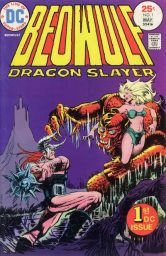 Comic Books (50 Year Old Comics): Two years later, as 1974 came to a close, a number of the titles mentioned above were gone, and most of those that remained had been through significant changes. All of Jack Kirby’s Fourth World books had been cancelled (as had a title introduced in 1972, The Demon), leaving the King with a current slate that included Kamandi, OMAC, and “The Losers” feature in Our Fighting Forces.
Comic Books (50 Year Old Comics): Two years later, as 1974 came to a close, a number of the titles mentioned above were gone, and most of those that remained had been through significant changes. All of Jack Kirby’s Fourth World books had been cancelled (as had a title introduced in 1972, The Demon), leaving the King with a current slate that included Kamandi, OMAC, and “The Losers” feature in Our Fighting Forces.
Radio (Comics Radio): A man stranded alone on a planet begins to hallucinate beautiful women. He realizes they are hallucinations, though. So when a woman shows up to rescue him, how does he know SHE’S real?
Comic Books (Atocom): James Allison lies on his deathbed, re-living a past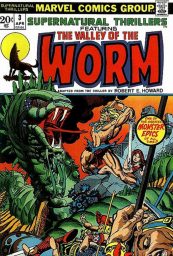 life. A millennia or more ago, he was Niord, a barbarian prince and warrior, defending his people, the Aesir, from all manner of threats, both human and inhuman. Aided by Gorm, a Pict he defeated in battle but refused to kill, who then became an ally, he guides his people to a new home…
life. A millennia or more ago, he was Niord, a barbarian prince and warrior, defending his people, the Aesir, from all manner of threats, both human and inhuman. Aided by Gorm, a Pict he defeated in battle but refused to kill, who then became an ally, he guides his people to a new home…
Pulp (Dark Worlds Quarterly): There are terms from franchises like Star Wars as often as there are expressions that are used in common parlance like “astronaut”. Sometimes the Science blokes think they came up with it first but they haven’t. Take “Dark Side” for instance. It became popular after the Soviet Luna 3 spacecraft on October 7, 1959, but Murray Leinster had used it twenty-eight years earlier.
History (DeDunking): New Egyptian Tomb Discovery Reveals The Lies of Egyptology
History (Serious History): Greatest Comeback in History | Byzantine Sassanid War.
History (MSN): Antarctica remained hidden from the world for a long time until some seafarers set foot on it. A team of researchers analyzed several documents to identify these seafarers, stated Live Science. The findings proved the popular theory of Western seafarers being the first to discover Antarctica wrong. The analysis was explained in the Journal of the Royal Society of New Zealand.
Sherlock Holmes (Old Style Tales): The following tale is one of the first to reveal Doyle’s taste for crime fiction, but it is a case far better suited for William Hope Hodgson’s Carnacki the Ghost-finder rather than Sherlock Holmes, for – unlike the feigned devilry of The Hound of the Baskervilles or “The Sussex Vampire” – the supernatural powers that haunt these victims are all too genuine. The format is one to which Doyle would return several times.
H. P. Lovecraft (Image Text Journal): Japanese mangaka Gou Tanabe’s nine-volume (so far) series for the Kadokawa publishing conglomerate, which began in 2004. Only five of those volumes—The Hound and Other Stories (2017), the two volumes of At the Mountains of Madness (2021), The Shadow Over Innsmouth (2023), and The Call of Cthulhu (2024)—have appeared in English from Dark Horse Comics.
Fiction (Pulp Super Fan): First off is The Big Book of Rogues and Villains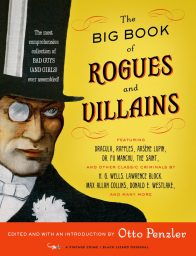 (2017), which is a little over 900 pages long, with 72 stories broken up into eight sections. There is an overall intro by Penzler, and each story is prefaced by a short intro on the author. As clear, the protagonists of these stories are rogues or villains.
(2017), which is a little over 900 pages long, with 72 stories broken up into eight sections. There is an overall intro by Penzler, and each story is prefaced by a short intro on the author. As clear, the protagonists of these stories are rogues or villains.
Please give us your valuable comment